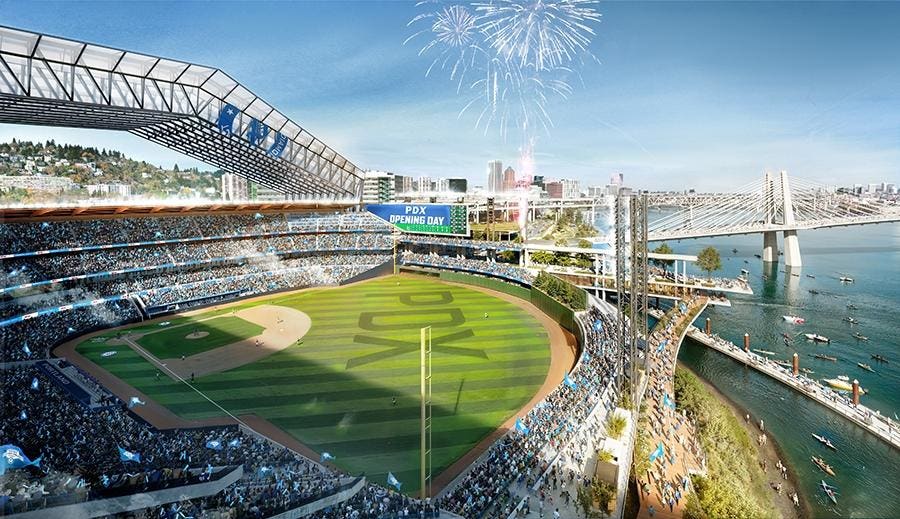Rendering of a possible waterfront ballpark south of downtown Portland.
The Oregon Legislature signed off on a bill that would cap funding at $800 million for a potential Major League ballpark in Portland. With total costs likely to be at or exceeding $2 billion, and additional expansion fees, many outstanding questions remain for the MLB to Portland effort.
Senate Bill 110 passed in the Oregon Senate in April, and the House approved the bill on Tuesday, sending it to Governor Tina Kotek, who has signaled that she will sign it into law. The bill was an update to SB 5, which passed into law in 2003 with construction bonds capped at $150 million. The funding mechanism would use a “jock tax” model, funneling state income tax away from the general fund for home and away players, as well as top executives, until the obligation was paid off. As was the case with the original bill in 2003, the law would only take effect if MLB awarded a franchise to Portland.
State and local politicians from both parties endorsed the bill, stating that an MLB team in Portland would generate local and regional economic activity in the downtown core, which has yet to fully recover from the pandemic.
MLB Commissioner Rob Manfred has stated that expanding the league from 30 to 32 clubs is a goal, with the key processes in place before he retires in January 2029, leaving approval of one team in the West and one in the East to his successor.
Lack Of Safeguards And Actual Realized Amount Lower
Unlike the original bill in 2003, which sparked considerable debate over who would guarantee the bonds, SB 110 saw no such discussion, raising concerns about safeguards for taxpayers. A potential labor dispute between the owners and players in the league, resulting in a lockout or strike that would lead to regular-season game cancellations, would disrupt the flow of state income taxes used to pay the bonds. While the lockout in 2021-22 pushed the start of the season out a week, the schedule was compressed, allowing all 162 games to be played. The expectation is that another lockout will occur in 2026-27 when the current labor deal expires, with odds of the owners pushing for a salary cap increasing. That would increase the odds of regular-season games being cancelled.
Craig Cheek, the head of the Portland Diamond Project, the effort to lure a team to Portland, acknowledged that there were no safeguards in place in the event of a labor dispute, but stated that the bonds would be privately owned and secured. He said that private equity and investors would make up any difference. Nothing in the bill memorializes that structure and guarantees that the general fund could not be tapped.
Overall, while the bill caps at $800 million, the actual amount would be far less, given underwriting, bond security, and interest.
With Total Price Tag Approx. $4 Billion, Ownership Still A Mystery
The construction of a waterfront ballpark targeted for South Portland would likely cost $2 billion or more. However, that would be only half of the total amount needed to have MLB award a franchise. A significant driver for the other 30 owners to allow the league to expand is the prospect of a $2 billion or more expansion fee, which would balloon costs to over $4 billion.
As was the case the last time Portland explored MLB expansion or relocation, the ownership group remains a mystery (full disclosure, I was part of the effort in 2001-03 and there never was an ownership group, instead leaning on the idea that should a club be awarded, the league would help cobble one together).
That puts the Portland effort at a disadvantage compared to Salt Lake City, which the Miller family leads – the former owners of the Utah Jazz – and has strong backing from Tagg Romney, the son of former U.S. Senator and presidential candidate Mitt Romney. Tagg is currently the Co-founder & Managing Partner of Solamere Capital. Solamere appears to be a key part of the effort, as Spencer Zwick, the co-founder of Solamere, is also listed as part of the effort.
While a letter of intent was signed in September of last year to purchase 33 acres for the ballpark, Cheek and the Portland Diamond Project have never disclosed who comprises the capital stack that would make the MLB to Portland effort a reality. Due diligence on the ballpark site was completed on January 22nd, and PDP has until March 2028 to finalize the deal. While the ownership group should have stepped forward by now, it will have to be abundantly clear by the March 2028 deadline whether the pieces are in place to make any MLB to Portland effort a contender to the Salt Lake City group. Still, the Portland Diamond Project will take signing Senate Bill 110 into law as the first step.




